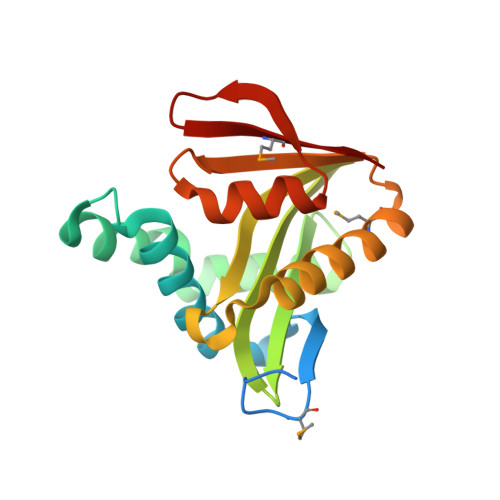Crystal structure of the novel PaiA N-acetyltransferase from Thermoplasma acidophilum involved in the negative control of sporulation and degradative enzyme production.
Filippova, E.V., Shuvalova, L., Minasov, G., Kiryukhina, O., Zhang, Y., Clancy, S., Radhakrishnan, I., Joachimiak, A., Anderson, W.F.(2011) Proteins 79: 2566-2577
- PubMed: 21633970
- DOI: https://doi.org/10.1002/prot.23062
- Primary Citation of Related Structures:
3F0A, 3FIX, 3K9U, 3NE7 - PubMed Abstract:
GCN5-related N-acetyltransferases (GNATs) are the most widely distributed acetyltransferase systems among all three domains of life. GNATs appear to be involved in several key processes, including microbial antibiotic resistance, compacting eukaryotic DNA, controlling gene expression, and protein synthesis. Here, we report the crystal structure of a putative GNAT Ta0374 from Thermoplasma acidophilum, a hyperacidophilic bacterium, that has been determined in an apo-form, in complex with its natural ligand (acetyl coenzyme A), and in complex with a product of reaction (coenzyme A) obtained by cocrystallization with spermidine. Sequence and structural analysis reveals that Ta0374 belongs to a novel protein family, PaiA, involved in the negative control of sporulation and degradative enzyme production. The crystal structure of Ta0374 confirms that it binds acetyl coenzyme A in a way similar to other GNATs and is capable of acetylating spermidine. Based on structural and docking analysis, it is expected that Glu53 and Tyr93 are key residues for recognizing spermidine. Additionally, we find that the purification His-Tag in the apo-form structure of Ta0374 prevents binding of acetyl coenzyme A in the crystal, though not in solution, and affects a chain-flip rotation of "motif A" which is the most conserved sequence among canonical acetyltransferases.
Organizational Affiliation:
Department of Molecular Pharmacology and Biological Chemistry, Northwestern University, Feinberg School of Medicine, Chicago, Illinois 60611, USA.
















